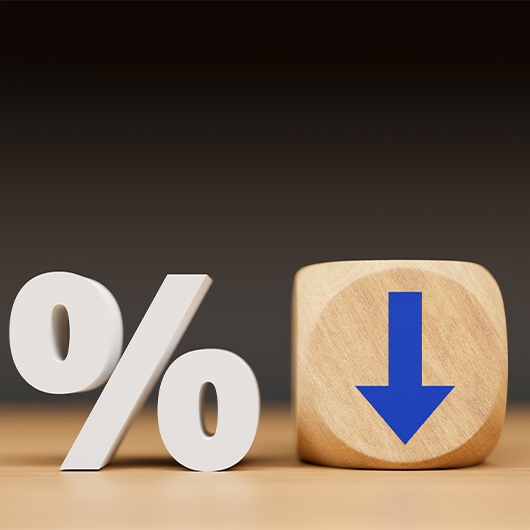Everything You Need to Know About Refinancing
Everything You Need to Know About Refinancing
Homeowners who refinance their home mortgage have the opportunity to lower their monthly payments, interest rates or shorten their loan term.Are you considering refinancing and wondering if it’s the right fit for you? Here’s everything you need to know to determine if refinancing is a good match for your situation.
What is refinancing?
Refinancing is the process of getting a new loan or mortgage with revised terms in favor of the borrower, allowing them to benefit from changes to payment schedules, lower interest rates and more.
How does refinancing work? When you’re approved for refinancing, your new loan terms replace the original agreement.
When is refinancing worth it? Borrowers typically choose to refinance when interest rates are low to take advantage of cost savings for the remainder of their loan balance. If you also need to cash out on some of the equity in your home, refinancing is worth considering.
Common types of refinancing
- Rate-and-term refinancing: Rate-and-term refinancing is refinancing your current first mortgage, plus any costs incurred to refinance the loan. You do not tap into your home’s equity to walk away with any cash or pay off any other debts such as credit cards, car loans or a second mortgage (also known as a home equity loan or home equity line of credit/HELOC).
- Cash-out refinancing: This type of refinancing allows you to “cash out” on some of your home’s equity, resulting in a new loan and cash in-hand. Cash-out refinance loans are more than your mortgage’s remaining balance, with the difference being paid to you that can be used for home improvements, debit consolidation, paying off a second mortgage and more.
Deciding between mortgage refinancing & home equity loan refinancing
When refinancing your mortgage, you can do a standard mortgage refinance or a home equity refinance. There are a few financial factors that can inform your decision, including your home’s value, the financial need that led you to consider refinancing, if you are looking to make home improvements and any associated fees or conditions (such as closing costs and appraisals).
Here are some specific things to consider when deciding between the two.
Making home improvements
Whether it’s exterior changes to boost curb appeal, a new room addition or simply upgrading the kitchen, updating your property is an excellent reason to do a home equity refinance. You can free up equity to spend on renovations and boost your home’s value (raising its equity through home improvements). Not all renovations will bring the same value to your home, so if your goal is to increase its value, you’ll want to make sure you choose renovations carefully. Learn more about what a home equity refinance for home improvements could look like.
Another option to consider for renovations is a refinance-rehab mortgage. This type of mortgage refinance uses the proposed improvements you would like to make to your home to determine its current value, and helps with knowing upfront if the improvements will increase its value. It is also a way of unlocking more equity as it assumes the value of the home subject to the completion of the repairs. Check with your lender to see if your financial institution offers this option.
Comparing interest rates
Since refinancing is usually done to take advantage of a favorable interest rate, it’s important to check rates to see how they compare to your current rate. Home equity rates tend to be higher than mortgage rates, but also typically don’t require Private Mortgage Insurance and have little to no closing costs, so it’s important to weigh all factors in determining total cost. Although mortgage refinancing offers a better rate, the savings could be voided if you don’t stay in the house long enough to recoup the additional closing costs.
Make sure to not only take the rate into consideration but what other costs could be as well—if the mortgage refinancing rate is only slightly lower than your current rate, for example, the closing costs might outweigh the benefits of refinancing.
Closing costs
Mortgage refinancing closing costs are typically less than the closing costs for the initial mortgage you took out. Talk to your lender about what the potential costs could be, as knowing what to expect will give you an idea of whether refinancing is worth it or if you’ll hit a break-even point by revising your original terms and conditions.
There are also no closing costs options for mortgage refinancing. If you are considering a no closing cost refinance, make sure to determine how this would affect your monthly payment or interest rate. While saving you out-of-pocket costs, it may cost you more in the long run, so how long you plan to stay in your house should have an impact on your decision as well.
As mentioned previously, home equity refinancing typically has little to no closing costs. Some lenders may allow closing costs to be financed as part of the loan rather than upfront or out-of-pocket costs.
Appraisals
In most cases, both mortgage and home equity refinancing require a new appraisal to assess the home’s current value. How does an appraisal work? An appraiser reviews the value of homes similar to yours in similar neighborhoods that have sold in the last 6 months, and adjusts the value of your home appropriately. Appraisals are an important factor to consider for both types of refinancing as a home’s value impacts your options. If you get an appraisal and your home’s value has increased, you could have access to extra home equity/cash from refinancing. Of course, if an appraisal shows that the home’s value is lower than it was, that could negatively impact the potential benefits of refinancing.
If you bought your house a while ago and don’t feel comfortable trying to estimate its current value, ask your realtor if they can provide you with a current market analysis, or your lender for direction on how to estimate your home’s current value. You can also keep track of home sales in your area to get an idea of what comparable houses to yours are selling for, or use online tools such as Zillow.
How long do you plan on staying in your home after refinancing?
How long you plan to stay in the home post-refinancing can impact how worthwhile it will be. Is this your forever home, or just a starter home for a few years while you save up for a bigger place? Does your job carry the potential of relocation? Will your family outgrow your current home?
If you don’t plan to remain in your home for long and you’re working with a larger mortgage over $200K, you may have more options with mortgage refinancing to spread out costs. Rate and credit adjustments can be taken in the form of rate and not fees, which provides more flexibility. Additionally, a 5, 7 or 10-year Adjustable Rate Mortgage (ARM) refinance is an option that can also offer flexibility in rate, payment and cost options.
For mortgages under $200K, home equity refinancing with little to no closing costs may be a more favorable option when you’re not staying in your home long enough to recoup the costs associated with mortgage refinancing.
If you’re looking to stay in your home for awhile and want a lower monthly payment spread out over a longer term, a standard mortgage refinance can offer that.
Refinancing can be a great option for lowering your monthly mortgage payment and for home improvement projects. Do your research to review your options and what is the best fit for you. Our lending experts are here to help!
This article is for general information purposes only and is not intended to provide legal, tax, accounting or financial advice. Any reliance on the information herein is solely and exclusively at your own risk and you are urged to do your own independent research. To the extent information herein references an outside resource or Internet site, Dollar Bank is not responsible for information, products or services obtained from outside sources and Dollar Bank will not be liable for any damages that may result from your access to outside resources. As always, please consult your own counsel, accountant, or other advisor regarding your specific situation.
Posted: September 01, 2021




